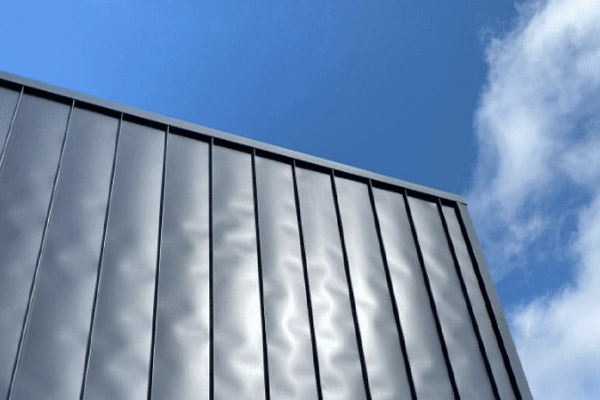No products in the cart.
Understanding and Mitigating Oil Canning in Metal Roofing

When embarking on a construction project, particularly one involving roofing, it's essential to make well-informed decisions from the very beginning. Your investment deserves careful consideration, meticulous planning, and the right materials. Opting for a standing seam metal roof over a traditional asphalt shingle roof is a smart choice. Metal roofs are renowned for their durability and longevity. However, they can suffer from an issue that affects their appearance – oil canning. At AMSI, we're here to guide you on understanding, preventing, and mitigating oil canning in metal roofing.
Why Preventing Oil Canning Matters
Oil canning, also known as stress wrinkling, is a cosmetic problem that can make your metal roof panels appear wavy or distorted.
While oil canning doesn't jeopardize the structural integrity of your roof, it can significantly diminish its visual appeal.
AMSI believes that achieving a structurally sound and aesthetically pleasing metal roof should be the ultimate goal.
Clarifying the Causes
Oil canning can occur with a number of commonly used construction materials like steel, galvalume, aluminum, galvanized, zinc, copper and more. Understanding what causes oil canning is crucial to differentiate between inherent material causes and those resulting from poor construction practices.
Also, darker colored metals tend to show oil canning more because they get hotter in the sun, which can make the metal warp more easily.
Oil Canning and Issues During the Production Process:
This wavy distortion can start in the early stages of metal production, especially during the flattening and coiling process. Here's a brief explanation of the issues that may arise during this production phase:
Can oil canning be fixed?
Ultimately, oil canning cannot be fixed unless metal panels are fully replaced. This makes careful construction and prevention all the more crucial early on. However, the appearance of oil canning can also look different depending on the color of the panels, the time of year, the outside temperature, so it may look less severe at times.
How can it be prevented?
Preventing oil canning effectively involves adhering to metal roofing best practices, which include hiring contractors with the proper training, but also making informed choices about the materials used. The selection of high-quality, thick material is fundamental in this regard. Thicker materials are less likely to bend or warp, which are common causes of oil canning. They provide a sturdier base that can withstand the stresses of installation and environmental factors better than thinner alternatives.
In addition to material thickness, the color and finish of the panels play a significant role. Light-colored materials are less prone to absorbing heat, which helps in preventing the metal from expanding unevenly – a condition that often leads to oil canning. Similarly, opting for a low-gloss finish can also be beneficial. These finishes tend to hide minor imperfections in the metal's surface, making any potential oil canning less noticeable. Learn more about oil canning prevention here.
The use of rib rollers is another key aspect of preventing oil canning. These tools create patterns on the metal panels, which not only add to the aesthetic appeal but also enhance the structural integrity of the panels.
The patterns of rib rollers can help in maintaining the flatness of the panels, offering additional resistance against the forces that cause oil canning. With various types of rib rollers available, including ribbed, v-ribs, bead, pencil, and striated, there is a range of pattern options to choose from, each contributing in its own way to both the look and performance of the metal panels.
The Installer's Vital Role
When planning and installing a metal roof, the importance of skilled installation in preventing oil canning cannot be overstated. Whether it's a professional job or a DIY project, meticulous attention to every detail during installation is crucial.
Firstly, ensuring that all materials are dry, properly stored, and in good condition is a fundamental step. Neglecting this can lead to the use of compromised materials, which increases the risk of oil canning.
Transporters, which protect the panels during transportation, are essential. Damage during transit can pre-dispose panels to oil canning, so safeguarding them is key. Furthermore, the use of metal clips and fasteners is crucial not just for structural integrity, but also as indicators of potential oil canning. Incorrect use or overdriving these fasteners can exert uneven pressure on the panels, leading directly to oil canning.
Including backer rods provides upright pressure that helps maintain the panel's flatness, a key element in preventing oil canning. However, if these are not installed correctly, they can cause more harm than good, either by not providing enough support or by creating additional stress points on the panels.
Achieving a visually pleasing finish and ensuring the long-term durability and functionality of a metal roof requires skilled installation and strict adherence to best practices. Navigating the complexities of challenges like oil canning is made easier with AMSI as your expert partner. Our commitment to providing top-quality materials and a profound understanding of proper installation techniques ensures your journey to a flawless and long-lasting metal roof is supported every step of the way.
Contact Us today to learn more about our standing seam metal roofing tools and supplies.